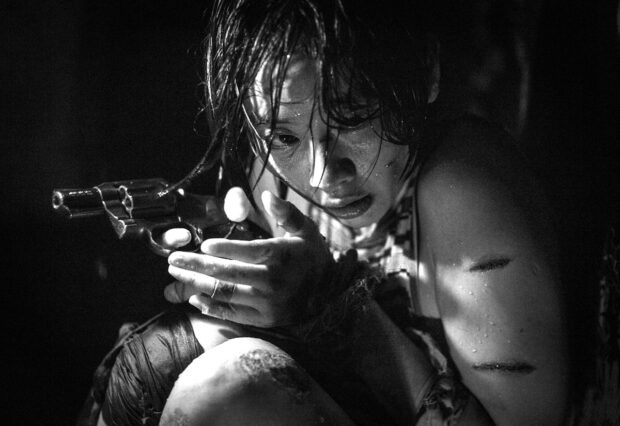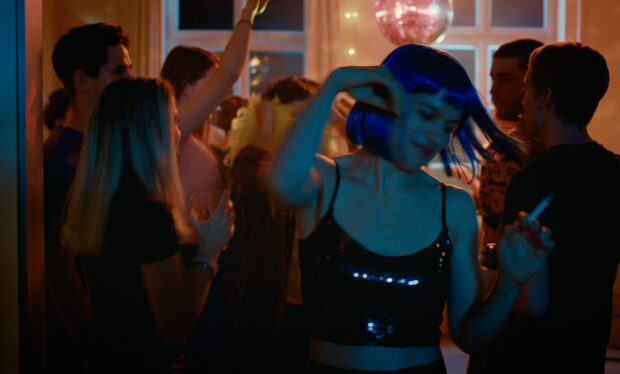
In a year when international travel seems like a distant memory, getting to spend a week at Berlin’s prestigious film festival feels like a singular treat.
Of course, the press screenings and film market this year were not in a physical theatre in Berlin. From the comfort of Sydney’s Inner West, I wandered through Berlinale’s carefully curated Competition, Encounters, Forum, Generation and selected shorts.
Through late nights and early mornings, I was moved to tears on more than one occasion. I laughed loud enough to wake up my partner. I found my little eyelids getting heavy as I burned the candle at both ends, only to be slapped back into consciousness by explicit sex on two separate occasions. Indeed, if there’s one thing to be said for Golden Bear winner Bad Luck Banging or Loony Porn, it has your attention for the entire 106 minutes.
Which is a rare gift over this last year. As we see the light at the end of long dark tunnel of a year, we have comforted ourselves with binge watching, rediscovering old friends or uncovering new favourites. Festival director Mariette Rissenbeek and Artistic Director Carlo Chatrian (and their teams) have curated an amazing collection of new stories from around the world, reminding us why film is such a unique and personal experience.
Some of these directly address the pandemic, or the social issues that have unified or divided the globe. France’s Albatros and Mexico’s A Cop Movie on directly turn their gazes on the police, joining the rest of the world in righteous reassessment. Others transport us to a different time and place, from the recent past (Ted K) to the not-to-distant future (I Am Your Man). In fact, it was the transition of time that ran through Celine Sciamma’s highly anticipated Petite Maman, a uniquely beautiful snapshot of youth, grief and reflection.
Highlights
Sciamma’s Petit Maman follows Portrait of a Lady on Fire, as the filmmaker returns to demonstrate her mastery and innate understanding of formative childhood moments, interior life and familial bonds. It’s an once a fairy tale and a meditation on dealing with grief, trauma and finding out that one’s parents won’t always be there for you.
Bad Luck Banging or Loony Porn is, to put it mildly, unexpected. If you make it through the first five minutes – which I will not spoil for you here – then you’ll get to one of the most unique films of this (or probably any other) year. Works best when we get to the satirical third act, in which a teacher is put on ‘trial’ by the PTA. The ending is destined to go down in history as the most outrageous in Golden Bear history. It’s the one time I wished I was with a festival audience, just to listen to them squirm.
Natalie Morales’ Language Lessons may have been the biggest surprise of the season. We all need to find connection, especially over the last year, and at its corazón this is what this charming spin on the ‘lockdown film’ does. While it’s not the first Zoom/phone based drama, and it certainly won’t be the last, it might be the most heartfelt. Filled with genuine surprises and emotional turns, this is one video call where you won’t want to have a sneaky browser open.
Asia in Focus
While the festival was surprisingly light on some areas of the world, Asia’s cinemas enjoyed prominent places in the top categories. Indeed, Hong Sang-soo’s Introduction ran against Ryusuke Hamaguchi’s Wheel of Fortune and Fantasy in the official Competition, with the former taking the Silver Bear for Screenplay and the latter awarded the prestigious Silver Bear Grand Jury Prize.
Introduction may feel like a minor Hong film, running just 66 minutes and split across two countries, but it maintains his distinctive style. Hong has refined his snapshots to a series of recurring motifs, a deceptively carefree style, and a company of familiar actors. Similarly, Hamaguchi’s anthology may not have the scope of Happy Hour (which ran for 5 hours) or the focus of Asako I & II, but contains many of the same overlapping stories and connections as his previous studies of human interconnectivity.
Taste and Limbo stood out for their distinct visual appeal. Indeed, it’s fair to say there was nothing quite like Taste at the festival: a stunningly photographed blend of fantasy and reality that’s also a rumination on colonialism and the primal nature of being. Meanwhile, Cheang Soi’s Limbo is a throwback Category III Hong Kong thriller that may not always feel cohesive, but it’s never anything less than stylish.
A thread of young women coming of age ran through Kwon Min-pyo and Seo Han-sol’s Short Vacation and Han Shuai’s Summer Blur. In the former, there’s some vague Daigo Matsui vibes (think Our Huff and Puff Journey) as a group of young girls travel to the countryside to photograph the end of the world. Yet what is has in ambition it lacks in focus. On the other hand, Han’s film takes a minimalist approach to show the perspective of a young girl facing major life moments.
Yujiro Harumoto’s A Balance intriguingly multi-layered character piece, with many strands that touch on some real and still unresolved issues in Japanese society. While it doesn’t hit all of its many marks, it remains a solid character piece for a filmmaker and marks him as someone to continue watching.
The shortest but certainly not the least of the Asian cinema offerings was Day is Done. Acting as a kind of follow-up to Summer is Gone (2016), with the same cast and characters several years on, Zhang Dalei’s short film sees the filmmaker return to his home town to capture a season’s worth of familial emotion in a compressed space.
Gems and favourites
As with any festival, there’s always a bunch of films that you didn’t plan on seeing going in, but wind up being some of your favourites on the way out. Benedek Fliegauf’s Forest I See You Everywhere is one such film. Filled with seven stories shot in a “micro-realist style,” some naturally work better than others. Yet when it fires — including a passionate Gandalf versus religion argument between mother and son — it’s an intense and engaging series of conversations.
In Germany’s The Girl and the Spider, the Zürcher brothers have bottled the uncertainty of moving house and magnified it several times in a psychological drama. On the other end of the scale is it’s American cousin The Scary of Sixty-First, a post-Jeffrey Epstein thriller from Dasha Nekrasova that’s similarly confined to an apartment. As both films take their cues from 1970s thriller kings Nicolas Roeg and Roman Polanski, they kind of make for a weird double feature.
What Do We See When We Look at the Sky takes the magical realism of two lovers cursed to change appearance each morning and exposes the everyday wonders of a town in Georgia. Meanwhile, Switzerland’s La Mif (The Fam) — winner of the Generation 14plus Grand Prix — is intense, intimate, raw and just very good at what it set out to do. Some might argue that it goes a little long, but it could have just as happily gone on twice as long and I would have been as captivated by its rhythm.
Nanu Tudor, Olga Lucovnicova’s deceptively quiet film in which women confront the titular uncle about past trauma, is a devastating, powerful and confrontational short. It’s easy to see why this won the Golden Bear for short film.
Tina Turner should never be last or least, which is why the documentary Tina is simply the best. A document of an eventful life and career, from filmmakers Dan Lindsay and T.J. Martin (LA 92), it covers a life Turner described perfectly in a 1985 interview: “I’m a girl from a cotton field that pulled myself above what was not taught to me.” As the film closes out with ‘The Best,’ it’s hard to disagree with one of the great survivors and entertainers of our time.
The Berlinale will return for the general public on 9-20 June 2021 for the Berlinale Summer Special. Full coverage, lists and ongoing reviews from our festival coverage can be found at my Berlinale 2021 festival portal and on my Letterboxd list.







